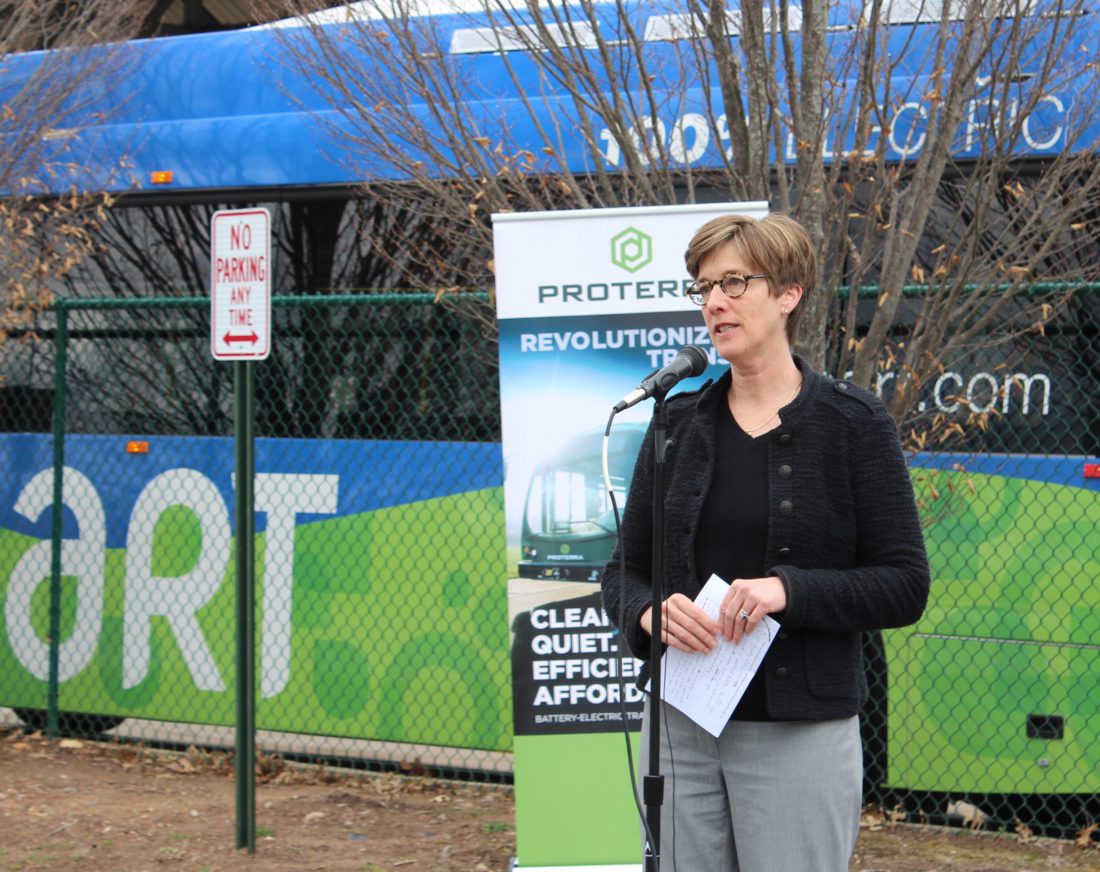While the biggest news to come out of Asheville City Council’s April 23 meeting was what didn’t happen — a hearing to rezone the historic Flatiron Building for hotel use was continued until Tuesday, May 14 — Council members did take action through their consent agenda. Included in those six items was the approval for City Manager Debra Campbell to apply for a federal grant supporting the city’s purchase of two hybrid buses.
The total cost of those buses, according to a city staff report available before the meeting, would be approximately $1.5 million, of which Asheville would contribute $225,000 in matching funds. In September 2017, the city received a $633,333 award from the same federal program to help offset the roughly $2.9 million purchase of five zero-emission battery-electric buses.
Although Council approved the motion, some members of the public considered the switch from battery-electric to hybrid buses as a step backward in the city’s efforts to reduce carbon emissions. City Transit Committee member Kim Roney, who spoke during public comment on the agenda, raised concerns about the city forgoing its proposed electric bus fleet for carbon-producing hybrid buses. She described the consent agenda, which also included a resolution to oppose offshore drilling, as a mixed bag of environment-related items.
“It’s really important for us to take this stand with the fight against offshore drilling, but on our same consent agenda, I see that we’re applying for a grant for hybrid vehicles,” Roney said. “I brought this up at the Transit Committee last week that that seems to go in opposition to where our stated goals are for sustainability.”
Councilwoman Julie Mayfield responded to the comments by noting that the electric buses, made by South Carolina-based Proterra, have experienced difficulties with battery life and length. The city mainly relies on 30-foot buses and so far, the company has only supplied 35-foot buses. Although the buses made a public debut in February with ceremonial loops around downtown, they have yet to be deployed in regular service.
Transportation Department Director Ken Putnam said that, while other companies do build smaller battery-electric buses that would fit Asheville’s needs, cities across the country have been returning those vehicles due to performance issues. Putnam said that a transition to fully electric vehicles remains a goal, but he sees the addition of the hybrid buses as progress.
“We want to transition, but what we’re trying to do too is anytime we can get an advantage of a grant, we’re trying to apply for it so that we can take care of the immediate need to try to get buses in our fleet,” Putnam said.
Mayfield told Xpress after the meeting that staff members are working with Proterra to address the battery life issues and reaffirmed the city’s pledge to develop an all-electric bus fleet.
“As I said last night, the city is not stepping back from our commitment to transition the fleet to electric,” Mayfield said. “We are all disappointed in this hiccup, but it will become easier as the technology and options develop.”



Seneca SC has been running the Proterra busses in residential loop, business loop, and Clemson commuter service for 2+ years now. Five feet (4 to 8 seats) in bus length is a ridiculous reason to reject a bus… I rode the GM TDH-32s operated by White Transportation in AVL in the 50’s and have ridden the Proterras and their predecessors from Seneca to Clemson and back many times. The Proterras have a less rough ride and are MUCH quieter than their diesel precursors
I don’t know what the City has against Proterra (other than it operates in a predominantly repubican state???
I’ve said it before and I’ll say it again — Tesla and others EVs are a total scam and fraud!
It’s really quite simple:
http://brusselstimes.com/business/technology/15050/electric-vehicles-emit-more-co2-than-diesel-ones,-german-study-shows
This German study even assumes the batteries last 10 years. The problem is that they probably won’t except for some very-specific corner cases.
The reason is how batteries work. They start to degrade chemically on the day they’re made, and do so more-or-less linearly. There’s nothing you can do about that — this happens even under ideal storage conditions. In addition there’s a “per-cycle” penalty too, because batteries operate through ion exchange across the electrolyte — that is, the physical movement of ions between cathode and anode.
That’s what a battery is — a means to move electrons from one place to another under some amount of force; you charge it by forcing them to go the other way (placing “tension” if you will into the reaction) and that tension is released when the battery is discharged.
Each time you do so you consume part of the battery; the amount you consume with each cycle depends greatly on how abusive you are in the cycle. If not very abusive then the per-cycle cost is low. If abusive then it’s higher.
In any event most Lithium-chemistry batteries will provide about 500 cycles of life provided you never abuse them and you consume those cycles within a couple of years. If you cycle the battery infrequently it will provide fewer cycles because time still passes and the time-based damage still accrues at a constant rate.
When you account for the required CO2 emissions to mine the raw materials for the batteries, refine those materials and assemble the batteries you’re better off driving a diesel bus or gasoline-powered vehicle.
Tesla and the Proterra EV buses are a scam and headed to zero.